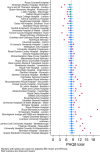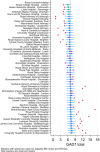Depression and anxiety in people with kidney disease: understanding symptom variability, patient experience and preferences for mental health support
- PMID: 39799543
- PMCID: PMC11961520
- DOI: 10.1007/s40620-024-02194-1
Depression and anxiety in people with kidney disease: understanding symptom variability, patient experience and preferences for mental health support
Abstract
Background: Depression and anxiety are commonly experienced by people with chronic kidney disease (CKD). This study aimed to evaluate person- and service-level factors associated with depression and anxiety symptoms. We sought to also understand utilisation of mental health treatments and preferences for future psychological support.
Methods: An online survey recruited participants from six UK kidney services with varying levels of psychosocial provision. The survey was also advertised on social media. Participants completed screening questionnaires for depression and anxiety, alongside questions about mental health history, self-efficacy, treatment and support. The study included adults (18 years or older) living with CKD (stages 3b and above) or those receiving any form of Kidney Replacement Therapy (KRT), including individuals with a functioning kidney transplant. Eligible participants had to complete study measures and be proficient in reading and writing in either English or Welsh, as the survey was administered in these languages. This survey was developed with our Patient and Public Involvement group and was administered from January 2023 until 31st January, 2024 using Qualtrics and RedCap.
Results: Four hundred fifty-eight people completed the survey. Moderate-severe symptoms of depression and anxiety were 37.7% and 26.5%, respectively. Over 50% reported a history of diagnosed depression. In addition to depression, sleep problems and fatigue were identified as future support needs, with over a third indicating a preference for in-centre provision. In case-mix adjusted analysis, there was no variability in depression and anxiety symptoms across centres. Centre location and size were unrelated to symptoms. Age, female gender, current mental health treatments, self-efficacy and perceptions regarding opportunity for support, were associated with symptoms of depression and anxiety. In sub-analysis, there was a negative association between psychosocial staffing levels and depression symptoms.
Conclusion: Patient-related factors and behavioural characteristics were related to variation of these symptoms. There was little evidence of symptom variability across centres, although in a small sub-analysis, psychosocial provision showed a weak negative correlation with depression symptoms. Our findings highlight preferences of future needs which could be helpful for designing future research and service provision.
Keywords: Anxiety; Chronic kidney disease; Depression; Mental health.
© 2025. The Author(s).
Conflict of interest statement
Declarations. Conflict of interest: None. Ethical approval: Ethical approval was granted from the UK Health Research Authority and a local university committee. Informed consent to participate: All participants provided informed consent.
Figures
References
-
- Palmer S et al (2013) Prevalence of depression in chronic kidney disease: systematic review and meta-analysis of observational studies. Kidney Int 84(1):179–191 - PubMed
-
- Huang CW et al (2021) Prevalence and risk factors for elevated anxiety symptoms and anxiety disorders in chronic kidney disease: a systematic review and meta-analysis. Gen Hosp Psychiatry 69:27–40 - PubMed
MeSH terms
Grants and funding
LinkOut - more resources
Full Text Sources
Medical
Research Materials



